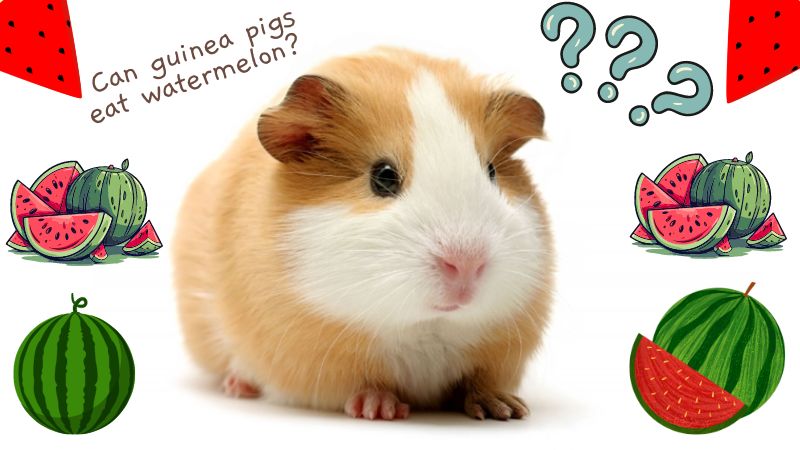Watermelon, with its juicy flesh and refreshing flavor, is a summertime favorite for many people. But can our small furry friends, guinea pigs, enjoy this treat as well? Let’s join Tropical Fish Haven to find the most accurate answer to the question can guinea pigs eat watermelon?
What fruit can guinea pigs eat?
Fruit is a healthy and delicious snack to feed your guinea pig regularly. They are full of vitamins and minerals that your guinea pig needs to stay healthy and strong.
Most guinea pigs have one tooth and will gobble up any fruit you give them, which makes them a great treat to use for training or when your pet has become special. exceptionally docile.
However, fruit is naturally high in sugar, so it should not be fed to guinea pigs as often as vegetables. About once or twice a week is usually enough.
When you introduce new fruit to your guinea pig, only give them a small amount at first to see if they like it.
Guinea pigs are often wary of new foods, so it may take some time before they get used to eating new fruit.
You should also monitor your pet over the next 24 hours to make sure they don’t develop diarrhea or an upset stomach from eating the new fruit.
Make sure you wash all fruits thoroughly before feeding them to your guinea pigs. All fruits and vegetables should be fed raw as guinea pigs cannot process cooked food very well.
Can guinea pigs eat apples?
Guinea pigs can eat apples. In fact, apples are full of fiber and flavonoids that are great for your Guinea Pig’s digestive system and overall health.
You should make sure that the apples you are feeding your Guinea Pig are ripe and not sour.
You can feed your Guinea Pig any type of apple but use caution if you decide to use green apples. These types of apples tend to be quite tart and sour.
The acid in apples can cause digestive upset and mouth sores, so it’s best to choose red/pink apples as they are usually sweeter.
Before feeding apples to guinea pigs, wash them thoroughly and cut them into small pieces (about 1/8 of an apple is enough).
Apple seeds are a choking hazard and contain cyanide, which can be harmful if consumed.
You can leave the apple skins on when feeding your Guinea Pigs, but make sure they don’t eat too much. Apple peels have a lot of fiber, which is very good, but if used too much, it can cause stomach upset.
Can guinea pigs eat grapes?
Yes, guinea pigs can eat grapes. Grapes contain vitamin B6, which can help boost guinea pigs’ activity levels.
This means grapes are a great fruit to feed your guinea pigs while they are exercising.
Additionally, grapes have a high water content, making them a great snack to feed guinea pigs on warm days.
You should choose seedless grapes when feeding your guinea pig this fruit. Make sure you wash the fruit thoroughly and cut it into small pieces so your pet can easily eat it.
As with all fruits, feed grapes in moderation. About ½ to 1 grape per guinea pig is more than enough because they contain a lot of sugar.
Can guinea pigs eat bananas?
Guinea pigs can eat bananas and banana peels/peels. Make sure the banana is ripe (not green) before you feed it to your pet.
Bananas are a rich source of vitamin C but contain a lot of sugar. This fruit should be fed very sparingly. A small slice of banana is enough.
Can guinea pigs eat strawberries?
Strawberries are safe to feed guinea pigs. Strawberry tops are also safe to feed to your guinea pigs.
Although strawberries are a good source of vitamin C, they contain a lot of sugar. A small slice is more than enough to feed your guinea pig.
Can guinea pigs eat raspberries?
Raspberries are safe when given to guinea pigs in moderate amounts. Raspberries are high in vitamin C but contain a lot of sugar, so 1 serving is an ideal serving for your pet.
Raspberries should be ripe before feeding them to your guinea pigs. Avoid red raspberries as they are not yet ripe!
Can guinea pigs eat pears?
Pears are safe for guinea pigs to eat. However, due to their high sugar content and acidity, they should not be fed too often.
About 1/8 of a pear is enough for your guinea pig. You can leave the skin on the pear as this is safe for your guinea pig to eat.
Make sure the pear is ripe and you remove the seeds from it before feeding it to your guinea pig. Pear seeds contain many traces of cyanide, which is harmful to your pet if consumed.
Can guinea pigs eat watermelon?
Watermelon is good for your guinea pigs to eat. They contain vitamin C and vitamin A and are a great cooling treat for your guinea pigs on hot days.
The peels are also safe for your guinea pig to eat. In fact, the rind of watermelon contains more nutrients than the flesh!
However, watermelon contains a lot of sugar so you should not feed them too often. Additionally, the high amount of water in watermelon can cause diarrhea and abdominal discomfort in guinea pigs.
A small slice no larger than 2 inches is more than enough for your guinea pig. Make sure you remove all the seeds before feeding this fruit to your pet.
What vegetables can guinea pigs eat?
Vegetables, especially green leafy vegetables, play an important role in your guinea pig’s diet.
A guinea pig needs a variety of vegetables to keep them healthy. They require about ¾ to 1 cup of vegetables per day, with one of these vegetables being leafy greens.
It’s important to note that some vegetables should be fed more than others. You can feed your guinea pigs vegetables like kale regularly.
Vegetables such as carrots and baby corn/ baby corn should be fed less frequently.
The following vegetables are safe for your guinea pig to eat:
- Kale
- Spinach
- Broccoli
- Cauliflower leaves
- Cucumber
- Cabbage
- Peas
- Green beans
- Carrots
- Pumpkin
- Beets (not leaves or stems)
- Asparagus
- Baby corn
- Celery
- Brussels sprouts
- Pumpkin (seeds removed)
- Pumpkin (seeds removed)
- Radish
- Parsnip
- Chicory
- Radish
- Coriander
- Corn
- Chili salad
- Lettuce
- Green Collard
- Watercress
- Basil
- Parsley
Conclusion
While watermelon can be a healthy and enjoyable occasional treat for guinea pigs, remember that moderation is key. Stick to small portions, remove any seeds, and choose organic watermelon whenever possible. By following these guidelines, you can safely share this refreshing summer fruit with your furry companion.





